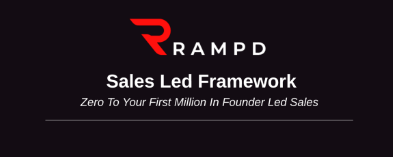Read Time: 4 Min
In the startup game, speed can make or break a company. Scaling too quickly can lead to many problems, including burning through a ton of cash and high customer churn due to an inadequate product. On the other hand, scaling too slowly can cause a lot of opportunities to go to waste and make it difficult to close your next funding round.
Your goal should be to scale quickly but responsibly.
What does “scaling responsibly” mean? Scaling responsibly means growing the business in a way that enables you to extract impactful feedback from paying users while also learning and iterating on your product from qualified opportunities that do not move forward. It’s a win-win regardless of whether you close or don’t.
In this issue, I’m going to teach you what I’ve seen work, how to implement it, and the correct way to scale responsibly, through the art of crafting a killer offer.
If used correctly, the strategy discussed will cut your sales cycle in half, increase conversions, and validate your assumptions about market demand, customer use cases, and product-market fit.
Paid Pilots Are The Fastest And Most Responsible Way To Validate And Scale Your Product.
How do we scale responsibly?
The way to scale responsibly is by charging for the proof of concept (POC). I’m amazed at how many founders struggle with this idea. Regardless of whether you charge or don’t, customers churn for three primary reasons.
- You didn’t deliver on expectations
- A cheaper competitor with comparable value
- Customer support/experience sucks

A client sent the message above to me. This is lazy advice and one reason why founders become confused.
To be clear. A paid POC is not incentivizing customers to churn – a poor scoping call before going live on the POC is.
The fastest and most effective way to get someone to use your product is through an offer. You create an offer that is impossible to refuse.
My dude Vito Corleone had it right!

If a prospect is willing to give you a vote of confidence and move forward on a pilot, they will probably want some assurances. Consider this: as an early-stage startup with no track record, social proof, or validated technology, it is a big decision for them to make.
This is exactly where the offer comes in.
Here’s how it works:
You present an offer (price) with two different guarantees to be delivered over a specified period. And if you can’t deliver on the two guarantees, you refund the money and allow them to use the platform for free for the next 30 days.
You present the offer in a way that makes them feel special, like you’re only extending it because you feel like you can crush it for them. And once you can deliver, you want two favors in return.
Here’s an example of how what this looks like.

One very important note. Before going live on the POC, you would have a scoping call to understand what they want to validate or solve with your technology. If you feel like you can’t deliver on their expectations based on what’s conveyed during the scope call, you don’t move forward on the POC.
Here are six reasons why this offer is so effective.
- You completely mitigate their downside risk.
- In many cases, it will cut your sales cycle in half.
- You have three chances to validate and close as opposed to one.
- If the POC is a success, the customer is very likely to move forward.
- You’re getting paid to build rather than building to hopefully get paid
- Following the scoping call, you can almost guarantee a successful POC.
This is how you scale responsibility.
That’s all for today, folks.
See you next week!
Darren
P.S. If interested in booking an intro call, you can do so here



